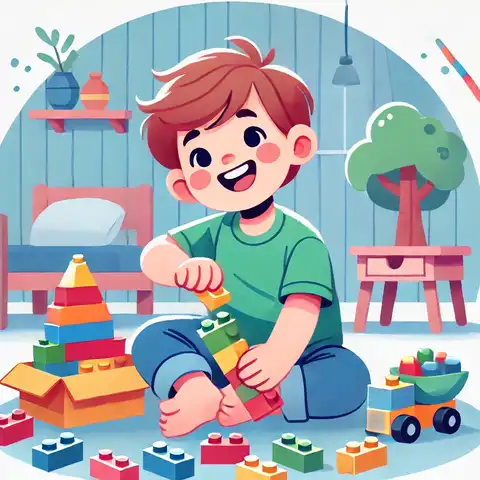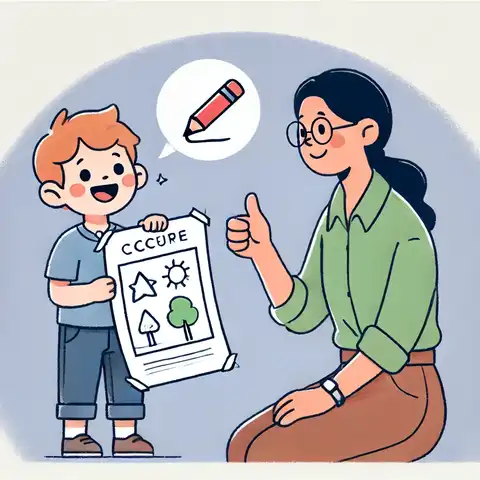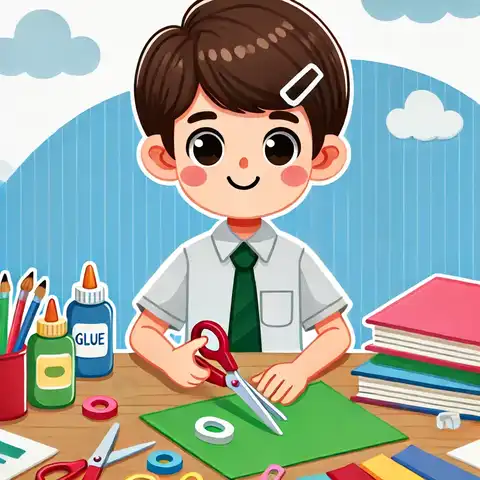How to help a perfectionist child? There is a gift and curse quality to perfectionism. It is good to aim for perfection, but it can only cause stress, anxiety, and frustration in kids. Helping A perfectionist child takes understanding, patience and encouragement.
Perfectionism in Children
For example, perfectionism in children involves striving to be perfect and never making a mistake. This is a fear of failure, and it explains why they already put so much pressure on themselves just because they are perfectionists.
Why is perfectionism in my child?
Personality traits, family environment and sometimes high expectations of parents or teachers (or peers) can lead a person to perfectionism.
How to Help a Perfectionist Child
Here are ten tips to support a perfectionist child:
1. Striving for Excellence Over Perfection

Your child needs to learn the difference between striving for excellence and trying to be perfect. But excellence is about doing your best and learning from mistakes. Perfection, on the other hand, dictates that nothing can go wrong. Remind them that mistakes are part of the learning process. Tell your child to lower their standards or unrealistic expectations.
For instance, if your child is upset that they did not ace a test, emphasise their effort and what was learned. You deserve to congratulate yourself by saying something like, “You tried your best”. What did you learn from this
2. Lean Into Who She Is

An understanding and acceptance of your child’s identity goes a long way. We all know that in other thinking patterns, which often plague us as a parent, it is the nature of every child’s strengths and weaknesses involved for our kids. Instead of trying to change this about her and support it in the conversation, how do we help her embrace who she is—detail-oriented and driven with a love for fast-paced challenges—as an asset?
For example, rather than letting your child know they have no reason to worry, say: “Oh, I see how much you care about doing well. How To Cope When Things Do Not Go As Planned
3. Nurture the Relationship

You need to be a solid, stable home base for this anxious little perfectionist because the last thing they want is anybody adding more stress to their already crowded metaphorical playing field.
Spend time with your child and be sure they feel comfortable coming to you about their thoughts and emotions. Provides Resilience — Children who feel loved and accepted can quickly adapt to setbacks.
: Spend quality individual time with your child (e.g., go for a walk or do a project). Let whatever moved them to move them, move them and speak naturally.
4. When They Face Hardship, Be Their Comfort

Perfectionist kids usually have very high standards for themselves, which can add a lot of pressure. When things don’t work out as expected, they may get frustrated, resulting in stress. Be present in those times to offer comfort and security.
Once things have sunk in a bit, let your child be disappointed and let them know you are there to support them.
You may even say to your child, “It is okay for you not to achieve something that goes as planned.” If you haven’t been getting these intimate moments with your child, start slow and build them up: diligence, not performance; blood into wine…I am right here with you… pride in your struggle… effort more important than success…. efforts to help mitigate anticipated excesses.
5. Establish Clear, Firm Limits

We all need support, but we also need HELLO and setting boundaries, lol. Perfectionist children often overwork themselves, causing significant burnout. Set healthy expectations and boundaries to help them learn to take a break in their pursuit of success. Show them it is fine to take some time off and that working harder does not always mean they will be better at what you expect.
Long-term example: Set a time limit with your child on how much time they should spend doing homework, and have them take breaks. You might think it, in a way, is close to, “We work hard for an hour and relax the following half.”
6. Praise Effort, Not Just Results
Perfectionist children often feel that their achievements are tied to who they are. Instead, congratulate them on their effort rather than the result to make it less black and white. Even if the outcome is unfavourable, praise them for their effort and perseverance.
So rather than “Good job getting an A”, it would sound instead like, “I am proud of all the effort and time you put into this project.”
7. Prioritize Processing Feelings
When perfectionist children struggle, they feel it. Help your child learn how to manage these emotions healthily. Help them articulate their feelings and teach them methods to deal with disappointment and frustration.
TIP: If your child is annoyed or upset, ask him to express his woes. You might say, “It’s understandable to feel disappointed. Tell me how you feel and what we can do next.”
8. Teach Problem-Solving Skills
Kids who are perfectionists might freeze if they hit a roadblock. Guide them through the process so they can also develop problem-solving skills. Teach them to divide tasks into smaller steps and think about how they can solve X problems from different sides.
For instance, when your child has difficulty completing a school project — work with them to brainstorm and plan together. You can reply, “Let’s slow this train down a bit; One thing at a time now. So what’s the first thing we can do?
9. Model Healthy Behavior
Kids want their parents to take responsibility, which is crucial for handling mistakes and difficulties. Teach your child that it is alright to make mistakes and that there are life lessons learned from them.
For instance, Admit when you are wrong to your child and tell them how you plan on correcting an error. For example, say, “Oops, this recipe was wrong, Valentine. “So here is what the regimen looks like right now.
10. Encourage Play and Creativity
Perfectionist perfectionists may get stuck pursuing a particular outcome, which can inhibit their creativity or sabotage much of the pleasure they are doing.
Encourage your child to do something creative or meet up with their favourite friend to do things that encourage play without additional pressure. It also makes it easier for the reader to loosen up and appreciate having those experiences instead of only caring about attaining them.
Encourage your child to do new hobbies like painting, drawing, or playing with LEGO. Focus on having fun and experimenting rather than making something flawless.
FAQs
Is your child a perfectionist?
Children who are perfectionists may show traits such as a fear of failure, becoming frustrated when things do not turn out perfectly and even procrastinating or spending lots of time on the perfect result.
Is being a perfectionist wrong (or good) for a kid?
Although perfectionism can be kept partially under control only, and some levels of striving for excellence are healthy, it is otherwise self-defeating behaviour that invites stress into our lives.
What can I do at home to control my child’s perfectionism?
You can assist by promoting effort over outcome, comforting them when disappointed and showing them how to deal with hurt.
What Not to Say to a Perfectionist Child
Do not focus only on your child’s achievements or say, «Sure, you’re perfect.» Instead, compliment them on their work and how hard they worked.
Does perfectionism lead to anxiety in kids?
Perfectionism is something that can cause or exacerbate anxiety in children, as it creates strain in trying to meet society’s standards of success and the fear of failure.
What are Strategies to Help My Child Set Realistic Goals?
Help your child set small, realistic goals and let them know that some of these naturally get out of hand.
How Can A Perfectionist Child Help Cope With Mistakes And Disappointment?
Let kids know it is okay to make mistakes; they are how we learn. Encourage them to think about what did not work for them and how they can do better next time.
Does the problem of perfectionism in children go away?
Luckily, with help and support, children can learn to deal with their perfectionism in more healthy ways when it comes to challenges or accomplishments.
Conclusion
Dealing with the perfectionist child is challenging but requires patience, understanding and balance.
Show your child that mistakes welcome lessons so they can explore their strengths free from the weight of expectation in perfection.
Emphasize to them the importance of effort, instill in them a growth mindset, and teach problem-solving skills. The rewards are derived from working hard, not necessarily just being number one.


